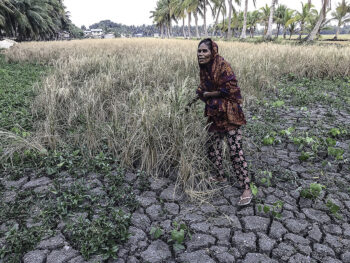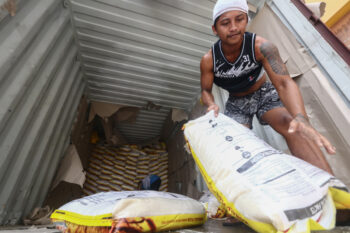DAVAO CITY (MindaNews / 5 May) – The current pandemic, otherwise known as the COVID-19 outbreak, has wreaked havoc all over the globe in so many ways and on various levels. The Philippines is no exception. Our ways of interaction, whether social, economical, and political have been disrupted and changed significantly in order to curtail or mitigate the effects of the pandemic on our society.
A “cure” for the virus has not been developed yet. In fact, the production and distribution of an anti-virus vaccine is said to be possible 12 to 18 months from now. Therefore, the Philippines, along with the rest of the world, will have to address this harsh reality by developing and implementing modified solutions. Our leaders need to address the adverse effects that the current severe measures and restrictions, including the Enhanced Community Quarantine (ECQ), are having on our national economy and the way we live and interact in general.
House Bill No. 6623, entitled “The New Normal for the Workplace and Public Spaces Act of 2020,” has been promulgated by members the 18th Congress of the Philippines led by Majority Floor Leader Hon. Alan Peter S. Cayetano as well as other esteemed colleagues. It offers some measures to implement in light of the current global situation
HB 6623 aims to provide measures to enable the relatively safe resumption of economic and social activities or interaction. It directs the establishment of mechanisms which will institute public health, safety, and security measures. The Bill initially delineates the roles, responsibilities and obligations of key sectors and individuals; identifies standards and protocols of management of physical spaces; identifies physical infrastructure, equipment and materials which shall facilitate appropriate actions/behaviors as well as promote proper information; establishes systems of accountability; and provides operational parameters, guidelines and recommendations.
In order to effectively and efficiently combat the further spread of the pandemic, the government has included general measures on the following:
- Universal and Mandatory Safety Measures;
- Management of Spaces;
- Management of Public Transportation;
- Monitoring of Schools and Learning Institutions;
- Monitoring of Private Commercial and Industrial Workplaces;
- The Role of Local Government Units;
- Workplace-Specific Protocols and Measures;
- Role of the Private Sector; and
- Responsibilities of Particular National Government Offices, Government Owned and Controlled Corporations (GOCCs) and Attached Agencies of these National Government Offices and their Regional/Provincial and Local Offices/Divisions; and Penalties.
The measures put forth in HB 6623 appear necessary and sound as they generally aim to protect the public not only from the virus but also from itself by preventing or mitigating the risky ways people interact with each other. The bill also seeks to facilitate changes in their behavior as to adapt practices that help prevent contraction of the virus by practicing good habits of cleanliness and observing proper social distancing. Clearly, the bill shows that the successful mitigation of the disease is everyone’s obligation and actually requires cooperation from ALL members of society.
On the other hand, lawmakers are still tasked with the responsibility of protecting the public by devising initiatives which would provide viable solutions to this serious and dangerous problem. For now, these initial measures can provide us with guidelines for this “new normal” way of life.
Even though HB 6623 has been formulated to reduce the resurgence of the pandemic in the Philippines after the modified resumption of our economic and social activities, the bill still seems incomplete as it fails to address some very important questions. Certain sectors of society will be greatly affected by it. People who are at high risk to contract the virus, such as the elderly, minors and persons with disabilities, have not been guided as to how they are supposed to act during the “new normal”. What are they supposed to do? Should they still be treated as they have been during the ECQ? Their rights and movements have been greatly curtailed during this time for their own health, safety and protection. Some of the people in such sectors are even employed, so how are they supposed to interact with the rest of society when they have even been banned from entering malls, markets and other public places. How should we deal with them when they also have rights and needs?
On another point, we all know there is a current shortage of medical and sanitation equipment and supplies in our society NOW. There appears to be a future problem as how we will be able to comply with the mandatory requirements of the law even though the supply for such products probably CANNOT meet the upcoming demand for the same as a result of the requirements set forth by the law when the bill is passed. How can the government still penalize those who fail to comply even if there is no supply? Will businesses be forced to shut down? Will workers have to stop working? The expense will also be great. Who will bear the cost of some of the supplies? In these trying financial times, it seems that many small companies may buckle under pressure of additional costs.
Furthermore, the cost of maintaining connectivity must be tackled. For small and medium enterprises (SMEs), students, and the general population, the additional expense for maintaining connectivity for itself, its customers and its workers might be too great to bear alone. This would mean that SMEs would have to provide for connectivity not only for their office but for their workers as well since not everyone has a stable connection or wi-fi at home. The same holds true for students, especially public school students who have just enough funds for their daily needs, and not for the constant use of mobile data or wi-fi for connectivity. The majority of the general population would not be able to transact online without internet connectivity, especially since they are living below the poverty line. The expense for such connectivity would definitely come in second to food, which is more of a necessity. So, how will this expense be handled? The government and the people are already heavily burdened financially by this “new normal.” Tele-com companies should be made to subsidize part of the expense since their income will greatly be increased as a result of the mandatory requirement to use the internet in order to carry out most economic and/or social transactions.
These are initial issues that need to be addressed. Other issues may even crop-up as further studies on viable measures are done. We owe it to the Filipino people, especially to those who are part of the Bangsamoro Autonomous Region in Muslim Mindanao (BARMM), to provide the most sustainable and viable measures or solutions possible.
(MindaViews is the opinion section of MindaNews. Mussolini Sinsuat Lidasan is a Member of Parliament of the Bangsamoro Autonomous Region in Muslim Mindanao.)







